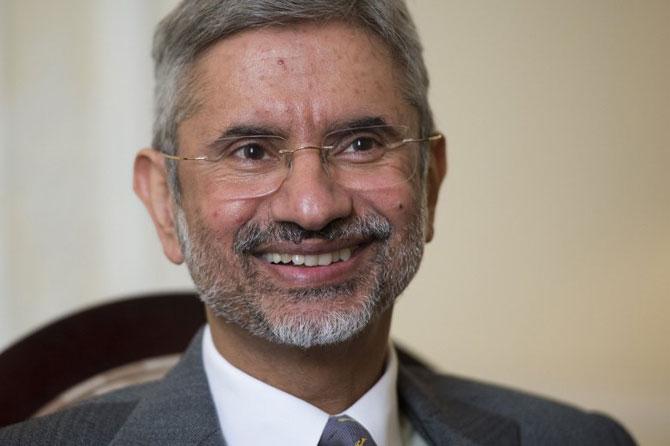S. Jaishankar, India's envoy to the US who was seen as having played a catalytic role in the turnaround in bilateral ties, Thursday assumed charge as foreign secretary, a day after the government in a late-night announcement "curtailed" the two-year tenure of incumbent Sujatha Singh seven months before her term was to end
New Delhi: S. Jaishankar, India's envoy to the US who was seen as having played a catalytic role in the turnaround in bilateral ties, Thursday assumed charge as foreign secretary, a day after the government in a late-night announcement "curtailed" the two-year tenure of incumbent Sujatha Singh seven months before her term was to end.
Jaishankar, who took charge in the morning at South Block, where the ministry of external affairs is housed, later met External Affairs Minister Sushma Swaraj.
ADVERTISEMENT

S. Jaishankar. Pic/ AFP
Sushma Swaraj, in a surprise set of tweets in the evening, said she was in the loop about the move to replace Singh and had in fact spoken to her.
"Since Dr.Jaishankar was retiring on 31st January, we had to issue orders of his appointment before that date. Then I spoke to Ms Sujatha Singh personally. I told her that the Government wanted to appoint Dr.Jaishankar as Foreign Secretary," she tweeted.
There had been speculation on social media and in news reports that Sushma Swaraj had been kept in the dark about the move by Prime Minister Narendra Modi. The government Wednesday night appointed Jaishankar, an Indian Foreign Service officer of the 1977 batch, as the new foreign secretary.
The cabinet's Appointments Committee, headed by Modi, decided to "curtail the tenure" of Singh "with immediate effect".
The surprise announcement came a day after US President Barack Obama wound up his three-day state visit during which India and the US saw a breakthrough announcement on the stalled civil nuclear deal.
Jaishankar, who was to have retired Jan 31, said he was "honoured" to be given the responsibility.
Taking over his new job at South Block, Jaishankar, who is known to have developed a close rapport with Modi who was impressed by his abilities to get things done, said: "My priorities are the government's priorities."
Sujatha Singh was not present at his takeover event.
In her farewell email to colleagues in the ministry, she said the foreign secretary plays a "critical role in being main point of interface with political leadership". "No individual is larger than institution. It has to be about institutions and how institutions interface," she added.
The Congress meanwhile questioned the government's decision, linking it to Obama's visit and Singh's stand on the Devyani Khobragade issue.
"Foreign secretary is head of foreign services... before you start gerrymandering with seniority and fixed tenure, you need to very categorically explain as to what is the reason doing so," Congress leader Manish Tewari told IANS.
"The decision coming as it does two days after the US president's visit... Is there a linkage between the stand which Sujatha Singh took on the Devyani matter and this is a belated retribution?" he said.
In December 2013, Khobragade, India's then deputy consul general in New York, was charged by US authorities with committing visa fraud and providing false statements in order to gain entry to the US for Sangeeta Richard, a woman of Indian nationality, for employment as domestic worker for Khobragade there.
The diplomat was arrested and strip searched by US federal law enforcement authorities. The Indian government took up the issue strongly.
The Bharatiya Janata Party (BJP), however, retorted that it is within the government's right to take decisions on appointments.
"I don't see any reason for hue and cry. A government is within its rights to decide how it would like to appoint what officers and with what responsibilities. And this is not the first time..... Preceding governments have taken (such) decisions," BJP spokesman Nalin Kohli said.
Jaishankar, as India's ambassador to the US, played a key role in bridging the widening gulf in relations between the US and India after he took over in December 2013, especially in the wake of Khobragade's arrest. He also played a major role in arranging Modi's hitch-free, high-profile visit to the US last September, officials said.
He was one of the key officers who negotiated the nuclear deal with the US as joint secretary (Americas) from 2004 to 2007 in the ministry. He was previously the envoy to China before moving as to the US. He had also been posted as ambassador to Singapore and the Czech Republic, and did stints in Sri Lanka and Russia.
 Subscribe today by clicking the link and stay updated with the latest news!" Click here!
Subscribe today by clicking the link and stay updated with the latest news!" Click here!






